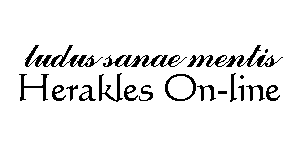Philip Slater (1968) said of Herakles:
"Even today he symbolizes exaggerated masculine
differentiation, with emphasis on secondary rather than
primary sex characteristics; muscularity rather than virility per se....
As such, he is difficult for an urban people to take
altogether seriously--a difficulty we share with the
Athenians of the classical period.
While Heracles is often boorish and a being of gross appetites
and homicidal passions...he is also portrayed as a culture hero:
ridding the world of monsters and lawless creatures, ending
human sacrifice, and performing useful engineering feats."
Glory of Hera, P. 339.
I've been a Herakles fan for about 25 years--probably since I
first read Slater's Glory of Hera, which is, after all,
what Herakles' name means.

Although I enjoy the Kevin Sorbo show, this site is dedicated
to a Herakles who didn't wear woven leather pants and
spurn mortal women. Most of all, the Herakles of this
site is not politically correct.
Herakles is a Greek name. Most of the sources I have
referred to are also Greek. Since K (but not C) is part of
the Greek alphabet, I have opted for this "variant" spelling.
If I were writing primarily about today's Herakles, I would
refer to him as Hercules.



